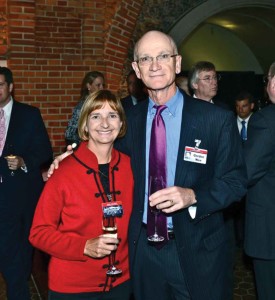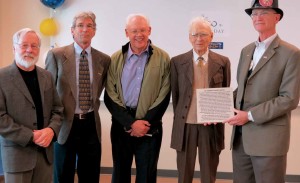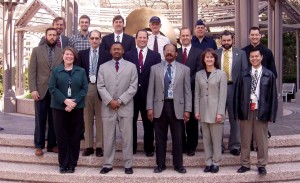Gordon Niva put physics to work in defense industry
Gordon Niva ’73 turned the theories of physics into a career with defense contractors overseeing the country’s missile defense system.

Gordon Niva and his wife, Susan Lahr ’75, pose at the 2013 International Missile Defense Conference in Warsaw, Poland.
Working for Rockwell International and Boeing, Niva spent his entire 32-year career as a systems engineer and system engineering manager. His training at State was in engineering physics and chemistry. He went on to earn a master’s in physics (1976) and a doctorate in astrophysics (1979) from the University of Nebraska.
“When I was young, I thought I would be a nuclear physicist. Then I became more interested in engineering physics and astronomy, which naturally led me to astrophysics,†said Niva, who grew up on a farm north of Aberdeen in the communities of Barnard and Frederick.
After being challenged in the Crothers Hall classroom by now-Professor Emeritus George Duffey, he wrestled with electromagnetic theory and quantum theory at UNL and had a great doctoral experience.
“In astronomy, you stay up all night, sleep all day and work with excellent people. It doesn’t get any better than that,†he remarked at a recognition luncheon at Nebraska in 1999.
With a doctorate in hand, Niva had a choice: do postdoctoral work or get a job in the aerospace industry, which had again started hiring. “I had graduate-student colleagues who went to California and got hired and that showed me the path. The salary was about twice that of a postdoc. Rockwell was working with the space shuttle, aircraft and missile technology. It was an exciting place to work.â€
Career starts with Peacemaker ICBM
His first position was as a flight controls systems engineer with the Peacekeeper intercontinental ballistic missile, which was first test fired in 1983. He continued to work with various missile projects until 1991, when he transitioned to missile defense work.
Niva considers the 20 years (1991-2011) when he worked in cruise missile and ballistic missile defense to be the highlight of his career. “I got to work across a number of different systems and engineer a way to defeat the threat (of an enemy missile). The whole business of engaging and disabling a missile is all Newtonian physics, which I happened to really enjoy.

Niva, far right, organized an effort to sponsor a new office for George Duffy, in Daktronics Engineering Hall in 2012. Professor Emeritus Duffy, fourth from left, joins Lynn Seppala ’68, Bob Busby ’72 and Arvid Lunde ’61.
“As a systems engineer, you’re like a general contractor. While specialists work on the various components of a complex system, it is the systems engineer who sees that it all hangs together.
“Our specific job was to take the existing weapon and sensor systems, the existing command and control systems, and modify them so they could operate together and share information. We created an overarching command and control system,†said Niva, who retired from Boeing as the deputy for modeling and simulation for Command and Control, Battle Management and Communications.
That is the nerve center of the global Ballistic Missile Defense System. Sensors located throughout the world track threatening ballistic missiles and share that data within the U.S. system.
Sensors target Iran, North Korea
For example, radar sensors in England and the Middle East watch for launches from Iran. There are radars in Japan and another in the Aleutian Islands that watch North Korea. Also, there are numerous space-based sensors watching for missile launches, he said.
The need for a missile defense system evolved in the 1980s as more nations gained the ability to produce missiles that could potentially strike the United States.
While no intercontinental ballistic missiles have been launched in an attack, “countries are always testing†their missiles, Niva said. In the missile defense industry, those launches are called “targets of opportunities. By watching these TOOs we can see how the system is working.â€
The job of systems engineer in the missile defense industry usually isn’t life on pins and needles. Typical days are emails, meetings, documentation and guiding the work of young engineers. “Usually it is hum-drum engineering, but every now and then something would come down from on high,†Niva said.
A request for information or a special study from a top Department of Defense official could turn activity in National Missile Defense on its ear, he said.
Career ends with 10 years on National Team

Niva, back row, fourth from left, poses with other members of the 2004 National Team-Threat Functional Working Group.
From 1996 to 2002, Niva was the cruise missile defense technical director and business development manager.
In January 2002, Boeing moved him to the Washington, D.C., area, with the Missile Defense National Team—a consortium of the five largest aerospace firms. Within that team, Boeing was the lead firm for overall systems engineering.
On the national team, he led the team that defined the global network of sensors, interceptors and command/control nodes tasked to defeat ballistic missile threats to the U.S. as well as to American forces overseas.
Niva retired from Boeing in 2011, but continues to do consulting work for Boeing and smaller technology businesses.
Newest adventure: mySmartHome
Now, he and his wife, Susan Lahr ’75, operate mySmartHome, a small Internet technology business founded out of their Laguna Niguel, California, home.
“It’s clear that we are in the early stages of a massive movement toward the ‘Internet of Things,’ where we will have situational awareness, control and lots of data from everyday items in our lives. These are all accessible from your smart devices or computers.
“One of the first areas to adopt this is going to be the home. There are many competing technologies and systems so we help customers cut through the clutter of competing systems and install a system optimized to their needs. We also hope to be job creators and possibly hire military people as installers as they transition to civilian life.
“There are 6 to 10 really useful things you can do in your home now, such as security sensors, water detection monitors, smart door locks, garage door controllers and automated gas or water valves, that don’t cost much.
Users can benefit from discounts on their home insurance and no longer need to pay monthly fees for offsite home monitoring. “You are never more than a click away from reassurance that all is well at home wherever you are,†Niva said.
Niva and Lahr make frequent trips to South Dakota. He serves on the SDSU Foundation’s Board of Governors and Lahr is on the Pharmacy Development Council.
A member of the College of Engineering’s 37th class of Distinguished Engineers (2013), Niva extolls the career opportunities for systems engineers. “Any engineering degree is a solid foundation for good systems engineering.
“Just about anybody who gets a degree in engineering and has the ability to see the big picture, to think outside his or her boundaries†could be a systems engineer, he said.
Dave Graves






